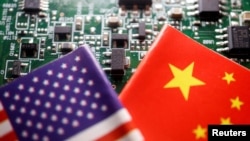Companies caught out by China's decision to restrict exports of two metals widely used in semiconductors and electric vehicles were racing to secure supplies on Tuesday as some industry suppliers worried that curbs on rare earth exports could follow.
Monday's abrupt announcement of controls from Aug. 1 on exports of some gallium and germanium products has ramped up a trade war with the United States and could potentially cause more disruption to global supply chains.
Analysts saw the move, which the Chinese commerce ministry said was to protect national security, as a response to escalating efforts by Washington to curb China's technological advances. It came on the eve of U.S. Independence Day and just before U.S. Secretary of Treasury Janet Yellen visits Beijing.
"China has hit the American trade restrictions where it hurts," said Peter Arkell, chairman of the Global Mining Association of China.
The European Commission expressed concern, while Germany's Economy Minister Robert Habeck said any broadening of controls to materials like lithium would be "problematic."
The Dutch government said the effect of the new rules would depend on how they are carried out.
One U.S. semiconductor wafer manufacturer said on Tuesday it was applying for export permits, while a China-based germanium producer said buyer enquiries had come in as prices surged.
The eight gallium and six germanium products cited are also used in other high-tech industries.
Some in the metals industry said they feared China could follow with new restrictions on rare earth exports, after curbing shipments 12 years ago in a dispute with Japan. China is the world's biggest producer of rare earths, a group of metals used in EVs and military equipment.
"Gallium and germanium are just a couple of the minor metals that are so important for the range of tech products and China is the dominant producer of most of these metals," Arkell said. "It is a fantasy to suggest that another country can replace China in the short or even medium term."
China produces most of the world's gallium and germanium.
In 2022, top importers of China's gallium products were Japan, Germany and the Netherlands, news website Caixin said, citing customs data. Top importers of germanium products were Japan, France, Germany and the United States, it said.
The commerce ministry will meet with major producers of the metals on Thursday to discuss the export restrictions, four people familiar with the matter told Reuters.
In a sign of the potential for new production outside China, Nyrstar said it would look at germanium and gallium projects in Australia, Europe and the United States.
Shares in Teck Resources, North America's biggest germanium producer, briefly jumped more than 1% in early trading. They were up 0.09% at 1937 GMT.
Shares in 5N Plus Inc., a Canada-based company that produces specialty semiconductors and performance materials, rallied 8.9%, while Neo Performance Materials, a recycler of gallium and manufacturer gallium trichloride, rose 5.73%.
Neo Performance CEO Constantine Karayannopoulos told Reuters that it would be difficult to meet market demand without Chinese gallium supply though workarounds could be possible with the "right industrial public policy incentives."
"This was probably the least consequential measure [that China could take], since it does not hurt as much as much as other options could," Karayannopoulos said. "On the other hand, it could give very significant impetus to North American and European governments – along with producers and consumers of high-purity gallium outside of China – to consider more seriously what it takes to establish supply chain optionality.”
While the new rules do not target specific countries, exports will be more difficult and China could deny licenses to some locations, said Bernstein analysts.
But any rise in prices for gallium- and germanium-based materials due to a lack of supply may result in semiconductor companies looking at alternative materials, they added.
Beijing last made a retaliatory move in May, when it banned some domestic sectors from purchasing products from U.S. memory chipmaker Micron.
Jefferies analysts said they saw the export controls as China's second, bigger countermeasure after the Micron ban.
"The risk of a rapid escalation of U.S.-China tension is not small," they said. "If this action doesn't change the U.S.-China dynamics, more rare earth export controls should be expected."





